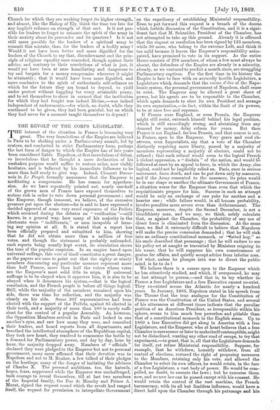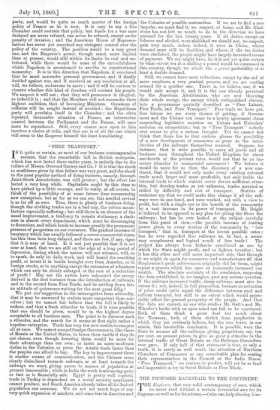THE REVOLT OF THE CORPS LEGISLATIF.
THE interest of the situation in France is becoming very great. The very foundations of the Empire are believed in Paris to be shaking under a Parliamentary assault, led by orators, and conducted in strict Parliamentary form, perhaps the last form of danger to which the Empire has of late years been considered liable. Napoleon, at first incredulous of defeat, so incredulous that he thought a mere declaration of his unshaken purpose would suffice to restore order, now visibly hesitates, and is believed by his immediate followers to be more than half ready to give way. Indeed, Clement Duver- nois in Le People formally announces that the Emperor is meditating a compromise. He has reason for apprehen- sion. As we have repeatedly pointed out, nearly one-half of the grown men of France have exposed themselves to serious risk in order to vote down personal government ; and the Emperor, though innocent, we believe, of the excessive pressure put upon the electors—he is said to have expressed a decided approval of some very cruel exposures of the Prefets which occurred during the debates on "verification "—still knows, in a general way, how many of his majority in the electorate were " indifferents," or men incapable of form- ing any opinion at all. It is stated that a report has been officially prepared and submitted to him, showing that he did not obtain more than a million of free votes, and though the statement is probably unfounded, such reports being usually kept secret, its circulation shows the tone of the popular suspicion. In an empire based upon universal suffrage, this vote of itself constitutes a great danger, as the papers are sure to point out that the eighty or ninety members denouncing any particular measure represent more than half France, more than half the voters whose votes are the Emperor's most solid title to reign. If universal suffrage is to be obeyed when it approves him, it is also to be obeyed when it denounces his system,—that is the logical conclusion, and the French people is before all things logical. Still, while the majority of the members remained upon his side, there was time for reflection, and the majority was clearly on his side. Some 207 representatives had been elected with the support of the Prefets, against 85 elected in their teeth, and a majority of more than 100 is surely suffi- cient for the control of a popular Assembly. As, however, the Opposition Members arrived in Paris and looked in one another's eyes, and saw how many they were, and consulted , their leaders, and heard reports from all departments, and breathed the intellectual atmosphere of the Republican capital, they took new heart, they resolved to commence the battle by a demand for Parliamentary power, and day by day, hour by hour, the majority dropped away. Numbers of " officials " declared they were pledged to the Emperor but not to personal government, many more affirmed that their devotion was to Napoleon and not to M. Rouher, a few talked of their pledges on the hustings, many of the danger of imitating the advisers of Charles X. The personal ambitions, too, the hatreds, hopes, fears, suppressed while the Emperor was unchallenged, took courage to reveal themselves, till at last two members of the Imperial family, the Due de Mouchy and Prince A. Murat, signed the request round which the revolt had ranged itself, the request for permission to interpellate Government on the expediency of establishing Ministerial responsibility.. Even to put forward this request is a breach of the decreer which forbids discussion of the Constitution, and it is a signi- ficant fact that M. Schneider, President of the Chamber, has not attempted to take up this ground. Already it is affirmed that the request or resolution has been signed by 125 members, while 30 more, who belong to the extreme Left, and think it too mild because it leaves the Emperor's responsibility unim- paired, have promised to vote in its support. As the entire- House consists of 298 members, of whom a few must always be absent, the defenders of the Empire are already in a minority, already, as we ventured to predict a month since, are struggling Parliamentary captives. For the first time in its history the Empire is face to face with an avowedly hostile Legislature, a Legislature which demands that the raison d'être of the Napo- leonic system, the personal government of Napoleon, shall cease- to exist. The Emperor may be allowed a great share of power, but his agents are to be responsible to the Chamber, which again demands to elect its own President and arrange- its own organization,—in fact, within the limit of its powers, to be at once free and supreme.
If France were England, or even Prussia, the Emperor might still resist, entrench himself behind his legal position, which is still exceedingly strdng, and abstaining from any- demand for money, delay reform for years. But then France is not England, far less Prussia, and that course is not, in France, open to the Emperor. Very grave and cool ob- servers, even Imperialists, say that a vote of the Chamber distinctly requiring more liberty, passed by a majority of members representing a majority of electors, could not be- refused ; that such refusal would seem to the logical French violent oppression, a " disdain " of the,nation, and would be followed at once by an appeal to force, in which the Army, also- logical, could not be implicitly relied on. Paris, once in serious, movement, faces death, and can be put down only by massacre, and if the Army consented to the massacre, its price would be in one shape or another the ultimate Government of France, a situation worse for the Emperor than even that which the- requisitionists prepare for him. Success in such an attempt would be only an exchange of one yoke for another and a. heavier one ; while failure would, in all human probability, involve penalties more severe even than dethronement. The- Emperor, moreover, despite the Second December, is not a. bloodthirsty man, and we may, we think, safely calculate- that, as against the Chamber, the probability of any use or direct force is eliminated from the discussion. At the some- time, we find it extremely difficult to believe that Napoleon, will make the precise concession demanded ; that he will sink: into an ordinary constitutional monarch, or "fatted hog," as- his uncle described that personage ; that he will endure to see- his policy set at naught or travestied by Ministers reigning inz his name, that he will suppress his own consciousness or genius for affairs, and quietly accept advice from inferior men.. Yet what, unless he plunges into war to divert the public- mind, is he to do ?
We believe there is a course open to the Emperor which he has attentively studied, and which, if overpressed, he may at last attempt to pursue,—and that is, to try whether in France a free Legislature and a free Executive cannot co-exist. They co-existed across the Atlantic for nearly •a hundred years. In January, 1866, Napoleon stated in his speech from, the Throne that the true analogue for the Constitution of France was the Constitution of the United States, and several; of his utterances at different times indicate that the peculiar- position of an American President, so irresponsible within his. sphere, seems to him much less powerless and pitiable than that of a constitutional monarch in the English sense. Up to. 1860 a free Executive did get along in America with a free- Legislature, and the Emperor, who at heart believes that a free- Chamber is sure sooner or later to makeitself contemptible, might not be disinclined, wanting any other road of escape, to try that experimenk—to grant, that is, all that the Legislature demands, for itself, yet refuse Ministerial responsibility. Suppose, for example, that he withdrew, honestly withdrew, from all control of elections, restored the right of proposing measures to the Members, retaining only his veto, and allowed the- Chamber to select its own officers, he would retain, in the face- of a free Legislature, a vast body of power. He would be com- pel]ed, no doubt, to execute the laws ; but he executes them: now, and no new law can be passed except with his consent. He. would retain the control of the vast machine, the French bureaucracy, with its all but limitless influence, would have a. direct hold upon the Chamber through his patronage and his
party, and would be quite as much master of the foreign policy of France as he is now. It is easy to say a free Chamber could restrain that policy, but funds for a war once declared are never refused, can never be refused,. except under penalty of invasion ; and the American House of Represen- tatives has never yet exercised any stringent control over the policy of the country. The position would be a very great one, and the Emperor's power, though much more limited than at present, would still within its limits be real and un- fettered, while there would be none of the untruthfulness which Napoleon is accustomed to ascribe to constitutional monarchy. It is in this direction that Napoleon, if convinced that he must surrender personal government, and if finally decided against war, and if resolved on any resolution at all, will, we believe, endeavour to move ; and it will be curious to obserye whether this kind of freedom will content his people. We suspect it will not ; that they will pronounce it illogical, as indeed it is ; and that the Members will not surrender their highest ambition, that of becoming Ministers. Occasions of collision will be sought instead of avoided ; the Republican party will proclaim itself in the Chamber ; and the often repeated, inexorable situation of France, an internecine quarrel between the Parliament and the Person, will once more be reproduced. Still, every course now open to him involves a choice of evils, and this one is of all the one which will seem to the Emperor himself the least humiliating.































 Previous page
Previous page